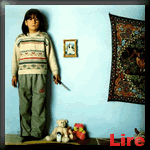| Organe de presse | ||||
| HOME | ||||
| Change
language |
|
|||||||||
| Droit Fondamental | |||||||||
 |
How to cleanse a rapist on the fringe of the Dutroux case
The life of "Jojo the Fritte", likely perpetrator of the Orbaix rape.
Nicknamed endearingly "Jojo" by police and "the
Fritte" or “Chippo” by the gypsies, George Dohy spent early
years as a fairground entertainer who lived in a caravan with his
mother. He married Françoise at the age of twenty-two, who was 20
at the time, five months after the birth of their son Gustave. They
separated three years later, when their daughter Kelly was thirteen
months.
"Jojo the Fritte" had stabbed his wife, whom he used beat
with a fork. He had also unsuccessfully shot and hanged his stepfather.
This double attempted murder was classified as "assault".
He was convicted in 1972 and sentenced to 18 months in prison, of
which 6 months were suspended and he was fined 50-BF fine for the
victims, or 2.48-€ for the two attempted murders.
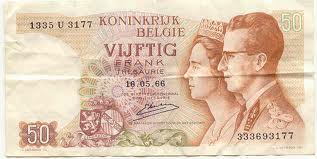 "Jojo
the Fritte" does not talk of his criminal record, but it is
reflected in the enormous number of € 1.24 fines that he has been
sentenced to pay for burglaries, assaults, trespass, breaches of
trust, counterfeiting of seals and more. He is above everything,
a dangerous sexual predator. He was sentenced in 1977 to four years
imprisonment for the repeated rape on the 10-years-old daughter
of his girlfriend and the violent attempted rape of a 15-years-old
girl. He was also convicted of the crime of outraging public morality.
After three years imprisonment, in a low security open prison, he
was found guilty of assault, injuries and procurement. He was sentenced
to an extra seventeen months for these offences. However he was
released on parole after six months. His € 4.96 nominal fine evidences
four victims.
"Jojo
the Fritte" does not talk of his criminal record, but it is
reflected in the enormous number of € 1.24 fines that he has been
sentenced to pay for burglaries, assaults, trespass, breaches of
trust, counterfeiting of seals and more. He is above everything,
a dangerous sexual predator. He was sentenced in 1977 to four years
imprisonment for the repeated rape on the 10-years-old daughter
of his girlfriend and the violent attempted rape of a 15-years-old
girl. He was also convicted of the crime of outraging public morality.
After three years imprisonment, in a low security open prison, he
was found guilty of assault, injuries and procurement. He was sentenced
to an extra seventeen months for these offences. However he was
released on parole after six months. His € 4.96 nominal fine evidences
four victims.
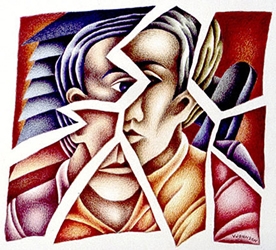 "Jojo
the Fritte" thought he was schizophrenic, with a double personality
that makes him lose control and consciousness of what he does. He
says he works for the police, but he was and is so mad that nobody
took him seriously. He does have a talent for endearing himself
and enticement, to obtain information that he notes in a little
notebook and reports to the police. He gave the names of a band
who would later be sentenced for the murder of an elderly person.
The case raises the question of his involvement in that murder.
Homicide, even by accident, is not a secret usually given to an
alcoholic and cunning gypsy.
"Jojo
the Fritte" thought he was schizophrenic, with a double personality
that makes him lose control and consciousness of what he does. He
says he works for the police, but he was and is so mad that nobody
took him seriously. He does have a talent for endearing himself
and enticement, to obtain information that he notes in a little
notebook and reports to the police. He gave the names of a band
who would later be sentenced for the murder of an elderly person.
The case raises the question of his involvement in that murder.
Homicide, even by accident, is not a secret usually given to an
alcoholic and cunning gypsy.
Police informers are not required to tell the truth. They just have to convince a judge of a "truth" plausible enough to close a case. The careers of magistrates and police officers depend on political appointment rather than the quality of their investigation. The exceptional number of cases solved by "Jojo the Fritte" makes him a legend in the "stolen car" department. He stole so many cars and then indicated their locations. He admits informally he does it to having peace of mind in dealing with his own affairs. Forged reports are allowed to swindle the insurance companies. They in turn give bonuses to informers who help finding the stolen vehicles. When they are returned by the garage that fetches the car, the police officers are thanked with free repairs.
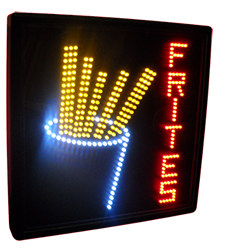 Odette
was 27 years and worked in a chip shop when she met "Jojo the
Fritte". He was 38 years. He hid the grounds for his imprisonment
from her, until she became pregnant. They lived at Mettet, in the
province of Namur. He pretended that the godfather of their son
was George Zicot, a police inspector of the "stolen car"
department of Charleroi, in the province of Hainaut.
Odette
was 27 years and worked in a chip shop when she met "Jojo the
Fritte". He was 38 years. He hid the grounds for his imprisonment
from her, until she became pregnant. They lived at Mettet, in the
province of Namur. He pretended that the godfather of their son
was George Zicot, a police inspector of the "stolen car"
department of Charleroi, in the province of Hainaut.
Françoise, his first wife, arranged the first meeting between her children and their father in grand-mother Blanche's caravan. She had wanted to protect them from his violence. They were 15 and 16. They thus naturally wanted to meet their father and their 9-months old little brother. Dohy, alias Jojo, had brought Inspector Zicot to give a good impression.
Françoise had regularly met this police officer at her best friend's house, a Mrs Peters, the wife of Auguste Peters, as he came check his cars. When Inspector Zicot wanted to seize Françoise's stolen car, she spoke of the problem to her ex-husband. Zicot then developed a sudden amnesia. Francoise was then able to sell her stolen car and buy another one. Zicot never noticed that he was controlling a garage which had no declared income. Auguste Peters was later convicted for money laundering and handling stolen goods in 2003, after Zicot was promoted to the Brussels area. "He is an excellent police officer", say his colleagues.
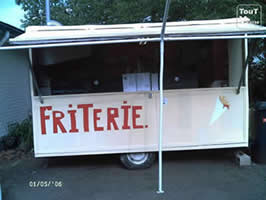 Kelly
was helping her step-mother at the chip shop. Her father asked her
to come and visit his lawyer with him. He took Kelly into a slag
heap, near strangled her with the safety belt, raped her then said:
"incest is not very serious". He brought her back to her
step mother, Odette, whom he beat with his fists flying and attempted
to drown her. He then said to Kelly that if she told her mother
what had happened, he would kill the whole family. He added that
it would be pointless to file a complaint, because he had great
influence with the police.
Kelly
was helping her step-mother at the chip shop. Her father asked her
to come and visit his lawyer with him. He took Kelly into a slag
heap, near strangled her with the safety belt, raped her then said:
"incest is not very serious". He brought her back to her
step mother, Odette, whom he beat with his fists flying and attempted
to drown her. He then said to Kelly that if she told her mother
what had happened, he would kill the whole family. He added that
it would be pointless to file a complaint, because he had great
influence with the police.
Kelly did not dare to talk. "Jojo the Fritte" was untouchable. The judicial police filed five official reports in an "internal dossier" between 1987 and 1989. The complaints included the rape of a 16-years-old girl and the beating of Odette, whom he raped at gun point. He was banking on the immunity magistrates frequently grant to police informers.
Odette had a niece called Cynthia who in turn had a boyfriend Fabien Nicaise. Fabian was grateful to Dohy for having taken him off streets where the not-so-caring Belgian social system had abandoned him when he was around 16, following the death of his brother. Dohy put him to work in the fairgrounds and promised a future as a fairground entertainer. Fabien lived, like everyone else, in fear of his violence and his madness. Dohy had asked him to have sex with his wife, Odette, whilst he looked out the window.
 The
organisation White Committee was surprised that Zicot, on October
2, 1991, had filed a report in which he states that George Dohy
denied a rape of a person under his "custody", but acknowledged
a consensual sexual relationship in a car. Zicot reports that Fabien
Nicaise confirms George Dohy's version and is supported by a second
witness Khelifa Brahim.
The
organisation White Committee was surprised that Zicot, on October
2, 1991, had filed a report in which he states that George Dohy
denied a rape of a person under his "custody", but acknowledged
a consensual sexual relationship in a car. Zicot reports that Fabien
Nicaise confirms George Dohy's version and is supported by a second
witness Khelifa Brahim.
It happens that the rape denied corresponds to the one that Cynthia filed accusing her uncle. She was only 14 at that time. She thus had not reached the age of consent required by the law for sexual intercourse with a 44-years-old serial rapist, even if her boyfriend, then aged 18, testified otherwise.
We now turn to a new episode. On November 19th, Dohy arrived drunk in the small hours of the morning on the doorstep of Michaëla, aged 19, the new girl-friend of his son Gustave, 23 by then. Gustave's first wife's family were not happy to hear that Michaëla was three months pregnant. His in-laws jumped on him. Gustave had a gun and a bullet accidentally touched his father-in-law's fore arm, as he fell in the scuffle. He went on the run. He became wanted for attempted murder. He stole a Ford Fiesta, and altered the chassis number to that of a wreck, and then had registered it under the name of his mother.
Mirella, the mother of Michaëla, sent her daughter to hear what her step-father had to say in the street. Dohy said Gustave had asked him to bring her to an appointment. Michaëla, who knew he was mad, agreed to sit in his Oldsmobile, but only if he would sit on the back seat. She kept the door of the car open and her feet on the pavement. He pretended to take a cigarette, jumped on the front seat. Mirella saw the car tear away, with legs of her daughter flying out of the passenger door, which was still open.
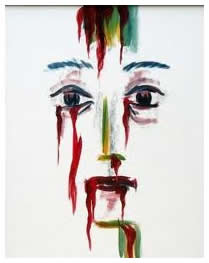 Dohy
took his daughter-in-law in a country lane and raped her at gunpoint,
at around 9 o'clock in the morning. After, he asked her to drive
the car to her home, even though she had no licence. When Mirella
saw her daughter trembling, staring, Dohy told her that she had
been afraid because he had taught her how to drive. She had to help
Michaëla to get out of the car and to support her, as she was unable
to stand on her legs. As soon as the home door was closed, Michaëla
turned and said: "Mummy, he raped me" and went straight
to the bath-room. She was crying. Mirella rushed out and screamed:
"What have you done to my daughter?" Dohy started the
car loudly and went on the run.
Dohy
took his daughter-in-law in a country lane and raped her at gunpoint,
at around 9 o'clock in the morning. After, he asked her to drive
the car to her home, even though she had no licence. When Mirella
saw her daughter trembling, staring, Dohy told her that she had
been afraid because he had taught her how to drive. She had to help
Michaëla to get out of the car and to support her, as she was unable
to stand on her legs. As soon as the home door was closed, Michaëla
turned and said: "Mummy, he raped me" and went straight
to the bath-room. She was crying. Mirella rushed out and screamed:
"What have you done to my daughter?" Dohy started the
car loudly and went on the run.
Gustave came back. He was outraged to hear what had happened. He told Mirella and Michaëla to go to the police and file a complaint. He did not go with them, because he wanted to avoid imprisonment for assaulting her father. Kelly, Gustave's sister, had by then been alerted by Michaëlla's sister and figured her father had planed everything. He had beaten Odette the day before, she had runaway as she always did, but so fast that she had not taken her son. Dohy had brought the child to Kelly after school and asked her to look after him for "an hour or two", but he never came back to fetch him.
 Kelly
joined Michaëla immediately at the sex-crime unit of the Charleroi
police. They discovered Dohy had told them identical stories, after
similar types of kidnapping. Strengthened by mutual support, Kelly
also filed a complaint against her father, the same day as Michaëla.
The police officers went with Mirella and Michaëla to the courthouse.
Prosecutor Marchandise took an appointment for Michaëla with the
medical examiner. He told them that the police patrols sent in search
of George Dohy had not found him, but that he would be jailed one
month automatically as soon as he was caught. He added that Michaëla
would not have confronted him as long as she was pregnant.
Kelly
joined Michaëla immediately at the sex-crime unit of the Charleroi
police. They discovered Dohy had told them identical stories, after
similar types of kidnapping. Strengthened by mutual support, Kelly
also filed a complaint against her father, the same day as Michaëla.
The police officers went with Mirella and Michaëla to the courthouse.
Prosecutor Marchandise took an appointment for Michaëla with the
medical examiner. He told them that the police patrols sent in search
of George Dohy had not found him, but that he would be jailed one
month automatically as soon as he was caught. He added that Michaëla
would not have confronted him as long as she was pregnant.
Gustave gave himself up to Zicot and gave him the keys of the stolen Ford Fiesta. He said that during interrogation Zicot had told him clearly he was not interested in his business, the car stealing, providing he did not go astray from his branch (such as stepping into the Narcotics Squad area). He was considered as following the footsteps of his father as a police informer. Françoise admitted having offered 100,000 BF (2,500 euros) to Zicot to free her son. She says he wanted double, and she did not have access so much money.
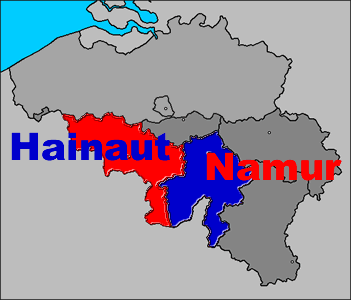 The
statements made on October 2nd show as a routine investigation ordered
by Judge Victorian Sohet to Zicot on the complaint of Michaëla,
55 days before her rape. This raises the question of how a public
prosecutor of the province of Hainaut could require the application
of the law on the rape to a young girl from the province of Namur,
who had not reached the age of consent. And why he gave her the
name of a young adult girl of his own constituency? All the reports
are positive: Cynthia was raped before Michaëla. She can only appear
in the "internal file" between 10 to 12 years of age.
In any event, Dohy was left free to rape his niece, aged 14 at the
most, without the normal one month automatic jail then applied.
The
statements made on October 2nd show as a routine investigation ordered
by Judge Victorian Sohet to Zicot on the complaint of Michaëla,
55 days before her rape. This raises the question of how a public
prosecutor of the province of Hainaut could require the application
of the law on the rape to a young girl from the province of Namur,
who had not reached the age of consent. And why he gave her the
name of a young adult girl of his own constituency? All the reports
are positive: Cynthia was raped before Michaëla. She can only appear
in the "internal file" between 10 to 12 years of age.
In any event, Dohy was left free to rape his niece, aged 14 at the
most, without the normal one month automatic jail then applied.
On November 27, Zicot filed a report related to a clarification report concerning contradictory statements of October 2. The officer reports that Michaëla refused the confrontation with her stepfather; that Fabien confirms his presence as an eyewitness and that Khelifa Brahim did not wish to make a statement. Yet, Michaëla had not mentioned Fabien or Khelifa Brahim as being in the car at the time of the rape. Dohy is only heard for the first time on this rape in mid-December and astonishingly, had not been able to present any witness before.
Mirella saw Dohy at on a fair three weeks after the rape. She reported to the police there was a mandate for his arrest and that Prosecutor Marchandise gave her the assurance that he would be jailed one month. The police confirmed the research warrant and arrested him. Mirella learned by calling the police at 8 o'clock the next morning that he had just been released. The first statements of Dohy on the complaint of Michaëla could thus have not been filed before mid-December.
A hearing of Mirella reveals that there has been a false confrontation, but to which her daughter was requested to assist one month after the arrest warrant was lifted, thus in mid-January 1992. Fabian said that he had never received the summons, but was trapped by Dohy. He knew nothing of the rapes at that time. Cynthia had kept silent. He did not know Gustave and Michaëla, but he had only heard of them.
Dohy used the reassuring presence of Odette to trap Fabien in his car. He thus could not have opportunity to talk to Cynthia about an appointment with the police, which would immediately have relieved her from her silence. Dohy told Fabien on the road that he had a problem with his son and stepdaughter. He asked him to testify that they were together on November 19. Odette understood only at that moment that if her husband needed a witness, it meant he had raped Michaëla. She did not dare say anything for fear that he would beat her. Fabien also said he agreed to give false testimony as he was frightened of contradicting Dohy.
 Zicot
and one of his colleagues receive Fabien, who has made a false testimony,
very brief, he said, and according to the request of his boss. Zicot
had Michaëla come into the office for a "confrontation"
is also very brief. She said she had been raped. Fabien answers
it was not possible because he was present and leaves, after which
he left the office. Zicot then accuses the young woman, to have,
when she was three months pregnant, accepted sex with her father-in-law,
in front of two witnesses, thus four in a car. Zicot asked her to
confront Dohy. She refused on the grounds that the Prosecutor Marchandise
released her from this obligation at the time of her pregnancy and
she leaves in tears. Mirella was furious and wanted to complain
to the Prosecutor Marchandise, but he was absent.
Zicot
and one of his colleagues receive Fabien, who has made a false testimony,
very brief, he said, and according to the request of his boss. Zicot
had Michaëla come into the office for a "confrontation"
is also very brief. She said she had been raped. Fabien answers
it was not possible because he was present and leaves, after which
he left the office. Zicot then accuses the young woman, to have,
when she was three months pregnant, accepted sex with her father-in-law,
in front of two witnesses, thus four in a car. Zicot asked her to
confront Dohy. She refused on the grounds that the Prosecutor Marchandise
released her from this obligation at the time of her pregnancy and
she leaves in tears. Mirella was furious and wanted to complain
to the Prosecutor Marchandise, but he was absent.
It was clearly impossible for Zicot to guess eight days after the rape that Michaëla would refuse a confrontation with her father-in-law two months later, without having been informed of the conversation with Prosecutor Marchandise. This false confrontation, of an unusual perversity, was a mere formality. The statements of Fabien were never be integrated into the court record, as it did not have the proper date and comments. He pretends that Dohy could not have raped Michaela due to his presence, and not that he had been an eyewitness to consensual sex.
The enquiry was not supposed to be closed before the birth of Michaëla's baby expected in May 1992, when the confrontation became possible. However the Charleroi tribunal closed the case on February 13. The magistrates covered the rapes of two gypsy girls aged 14 and 15 on the grounds of "lack of charges" to prosecute the rape of a 19-years old gypsy, in knowledge of her pregnancy. They did not advise the complainants that they could appeal their judgement.
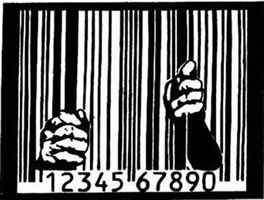 Gustave
was imprisoned for six months, even though the council chamber ordered
his release every month. Françoise is convinced that her son has
been subject to an arbitrary detention, because he refused to become
a police informer. The Belgian arbitrary detentions depend on the
sole Ministry of Justice, are thus political decisions. This would
imply that government policy did not aim to curb crime, but rather
to organize it.
Gustave
was imprisoned for six months, even though the council chamber ordered
his release every month. Françoise is convinced that her son has
been subject to an arbitrary detention, because he refused to become
a police informer. The Belgian arbitrary detentions depend on the
sole Ministry of Justice, are thus political decisions. This would
imply that government policy did not aim to curb crime, but rather
to organize it.
Zicot investigated the rape of a young girl left half dead at Orbaix on November 22, 1995. It was the eighth rape with the use extreme violence of an identical type within a radius of 50 kilometres around Dohy. It was also the eighth enquiry dependent on the sex crime unit of the province of Namur, which was allotted to the stolen car unit of the province of Hainaut.
Dohy kidnapped Odette around that time, which made no sense, except to obtain a false alibi. He had indeed recognised another child the year before. He thus saw no offence when Odette left him six months earlier. He had no motive to force the gendarmerie to free Odette, except if he needed an official report on another crime the same day, at an unknown hour.
The investigation on the Orbaix rape was focussed on Marc Dutroux, who was cleared by DNA tests. Dutroux was kidnapping young girls to sell them abroad, not to leave them half dead after a single rape. Zicot had just stolen a truck that Dutroux had stolen previously. The police inspector had left it in a nearby street, and made a false report, so that another informer could get the bonus from the insurance company. The Orbaix rape was to be dismissed with an "unknown culprit" in a few months, which reminiscent of the favours to the best police informers. No court saw fit to order Dohy to answer for having kidnapped, beaten and injured Odette.
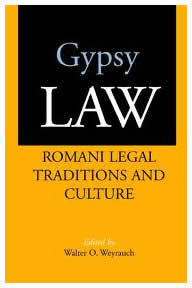 On
December 12, 1995, Fabien Nicaise and Tony Dohy, a nephew of “Jojo
the Fritte”, decided that if the Belgian justice could not do its
work, they had to do so, according to the gypsy law. The first bullet
hit the leg of the "Jojo the Fritte". The second would
have entered his jaw and come out of his neck, brushing his carotid.
Odette, torture during ten years by denial of justice, was accused
of complicity on the spot and imprisoned for three and half months,
before the court chambers cleared her. She was in prison on February
24, 1996, when Dohy again raped a 44-years-old woman. This raises
questions about the alleged state of the serial rapist's jaw, and
scant information that newspapers publish. Kelly said she was sorry
that her cousin's bullets had missed her father as he had hurt so
many people.
On
December 12, 1995, Fabien Nicaise and Tony Dohy, a nephew of “Jojo
the Fritte”, decided that if the Belgian justice could not do its
work, they had to do so, according to the gypsy law. The first bullet
hit the leg of the "Jojo the Fritte". The second would
have entered his jaw and come out of his neck, brushing his carotid.
Odette, torture during ten years by denial of justice, was accused
of complicity on the spot and imprisoned for three and half months,
before the court chambers cleared her. She was in prison on February
24, 1996, when Dohy again raped a 44-years-old woman. This raises
questions about the alleged state of the serial rapist's jaw, and
scant information that newspapers publish. Kelly said she was sorry
that her cousin's bullets had missed her father as he had hurt so
many people.
On April 20, 1996, the Prosecutor Marchandise did not find it appropriate to require the revocation of parole of Dutroux, given the need to wait for him to be judged guilty of three kidnappings. However, he was obliged to do so in August, after Dutroux had been imprisoned on suspicion of sixteen recurrence of kidnapping and filmed rapes of young girls, four of whom had been murdered.
Judge Connerotte summoned Zicot to answer for protecting Dutroux and "Jojo the Fritte" with false official-reports. The policeman was so confident that he answered the magistrate "If you accuse me and arrest me you'll light a fuse that you'll never be able to extinguish".
The Prosecutor Bourlet required that the stolen cars and the rapes of the young girls be tried separately. The rapes Dohy's were dumped in the stolen car category. Prosecutor Marchandise was cleared by his peers of the government policy of immunity to police informers, on the grounds of overwork and lack of means. He never had to explain why then, he increased the work and reduced the means of the province of Hainaut, to treat cases dependent of the province of Namur, out of his territory. Thierry Marchandise is the present president of the Association of magistrates in Belgium.
Fabien Nicaise and Tony Dohy were sentenced in 2003 to three years in prison for the attempted murder, thus three times the sentence of "Jojo the Fritte" for two attempted murders in 1972.
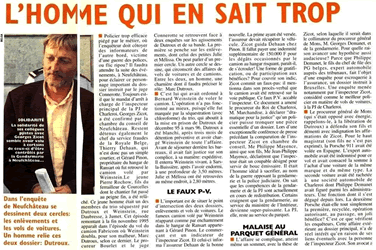 The
presumptions of corruption affecting the Belgian judiciary following
the Dutroux case resounded around the world, when in 2005, Judge
Bernard Desmette presented the Dohy case, he rubbed out of the blood
and tears of the little gypsy girls. "In any event", will
conclude judge Desmette after a long and almost burlesque presentation
"we can raise the question of the prejudice that the information
argued supposes. A forged document is criminally punishable only
when it is likely to cause a prejudice." At least five rapes,
Your Honour, and a bullet that brushed the carotid of the rapist.
The
presumptions of corruption affecting the Belgian judiciary following
the Dutroux case resounded around the world, when in 2005, Judge
Bernard Desmette presented the Dohy case, he rubbed out of the blood
and tears of the little gypsy girls. "In any event", will
conclude judge Desmette after a long and almost burlesque presentation
"we can raise the question of the prejudice that the information
argued supposes. A forged document is criminally punishable only
when it is likely to cause a prejudice." At least five rapes,
Your Honour, and a bullet that brushed the carotid of the rapist.
Ironically, Zicot was acquitted from his forged official reports for lack of evidence. He asked 100,000 Euros in damages for 35 days in jail. The Cour de Cassation granted him his request in 2009, emphasizing "the inhuman treatment to which (Zicot) presumed innocent, was the subject". This was fifteen times more than the ministry of justice had accepted.
The worst is that nobody, not even the parents of Dutroux's victims supported the gypsies. This is unforgivable. Can we expect the reopening of the investigation on the rape of Orbaix, of which the media have talked so much, or have the DNA samples conveniently disappeared so that the Justice system can again absolve itself from administering justice?


